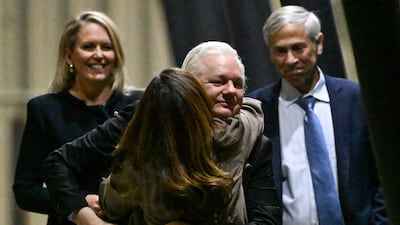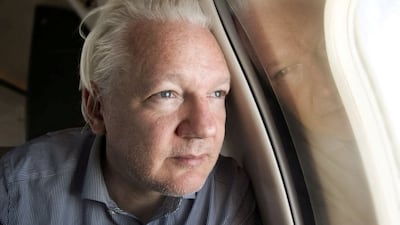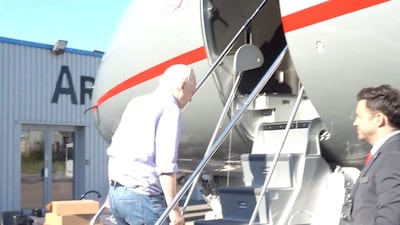WikiLeaks founder Julian Assange has been released from prison in the UK and left the country after a plea deal with US authorities.
A private plane flew Assange, 52, from London to Bangkok, where it stopped for refuelling, touching down at Don Mueang airport at about 12.30pm local time on Tuesday.
The plane, which Assange's wife Stella said he paid $500,000 to charter, arrived in Saipan, capital of the Northern Mariana Islands, a US territory in the Pacific on Tuesday.
He will appear before a judge on Wednesday morning to plead guilty to one charge after the US dropped 17 other espionage charges against him.
He will then fly to his native Australia to be reunited with his wife, two young sons and other members of the family.
He is expected to plead guilty to a felony charge and be sentenced to five years and two months in prison, with credit for the same amount of time spent behind bars in Britain.
One of Assange’s former lawyers said that if he had lost this latest appeal, a Labour government would have blocked his extradition.
“Even if America was successful, it would depend on the government of the day as to whether he was actually extradited,” said Geoffrey Robertson, from Doughty Street Chambers.
“I think they have thrown in the towel because they know, as everyone else knows, that we are going to have a Starmer government next week and they couldn’t rely on a Labour government to put him on a plane.”
In a post on X, Ms Assange said: “Julian is free! Words cannot express our immense gratitude to you – yes you, who have all mobilised for years and years to make this come true. Thank you. Thank you. Thank you.”
Speaking from Australia on Tuesday, she told BBC Radio 4's Today programme: “It's a whirlwind of emotions.
“I mean, I'm just elated. Frankly, it's just incredible. It feels like it's not real.”
Julian Assange released - in pictures
Asked about the conversations that led to his release, Ms Assange said: “Well, it's been so touch and go, we weren't really sure until the last 24 hours that it was actually happening.
“We were talking about – I don't know, what he needed to do and take from his cell and I also had to pack things up and head out to Australia 24 hours before he left.
“So, it's just been non-stop for the past, I think, 72 hours.”
The plane was also carrying a WikiLeaks lawyer, a representative of the Australian government and a medic to check on Assange's health.
The agreement that led to his release has resolved a long-running legal saga that crossed continents, centred on the publication of classified documents and threatened media freedom.
It is the first time Mr Assange has travelled out of the UK since 2012 after spending seven years seeking asylum in the Ecuadorean embassy in London, and then in imprisonment in Britain.
Mr Assange is expected to plead guilty to an Espionage Act charge of conspiring to unlawfully obtain and disseminate classified national defence information, the Justice Department said in a letter filed in court.
Former vice president Mike Pence slammed the plea deal on X as a “miscarriage of justice” that “dishonours the service and sacrifice of the men and women of our Armed Forces”.
Alexander Downer, former Australian high commissioner to the UK, said Assange will not be universally welcomed home, due to the fact that he admitted to a "very serious charge", releasing a huge amount of information, some of which "endangered lives".
Announcement of the deal came two weeks before Assange was scheduled to appear in court in Britain to appeal against a ruling approving his extradition to the US.
The guilty plea, which must be approved by a judge, ends a criminal case dealing with Assange obtaining hundreds of thousands of sensitive government documents leaked by former US Army intelligence analyst Chelsea Manning that divulged military secrets about the wars in Iraq and Afghanistan.
Assange published the files marked “top secret”, “secret” and “confidential” – which require some of the highest levels of clearance to view – on the hugely popular WikiLeaks website. He was indicted by a US federal grand jury in 2019 on 18 counts.
Investigators have repeatedly asserted that Assange's actions broke laws meant to protect sensitive information, and that they put the country's national security at risk.
Ms Manning served seven years in prison for breaching the Espionage Act.
In a statement posted on X, the official WikiLeaks account said Assange left Belmarsh Prison, south-east London, on Monday morning “after having spent 1,901 days there”.
“He was granted bail by the High Court in London and was released at Stansted airport during the afternoon, where he boarded a plane and departed the UK,” the statement read.
“This is the result of a global campaign that spanned grass-roots organisers, press freedom campaigners, legislators and leaders from across the political spectrum, all the way to the United Nations.
“This created the space for a long period of negotiations with the US Department of Justice, leading to a deal that has not yet been formally finalised.”
Legal saga
The hearing is taking place in Saipan because of Assange’s opposition to travelling to the US mainland and the court’s closeness to Australia.
It is his first time travelling since 2012, after spending seven years seeking asylum in the Ecuadorean embassy in London, and then in imprisonment in the UK.
He took refuge in the embassy in order to avoid extradition to Sweden, where he faced accusations of sexual assault that were eventually dropped.
He met his wife while he was holed up in the embassy, then married her in a ceremony in prison. They now have two young children.
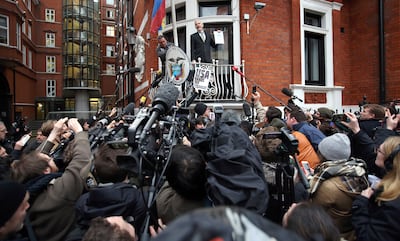
Assange had been detained in the high-security Belmarsh since April 2019 as he fought a lengthy legal battle against his extradition to the US.
In a January 2021 ruling, then-district judge Vanessa Baraitser said Assange should not be sent to the US, citing a real and “oppressive” risk of suicide, while ruling against him on all other issues.
Later that year, US authorities won a High Court bid to overturn this block, paving the way towards his extradition.
Assange was due to bring his own challenge to the High Court in London in early July after he was recently given the go-ahead to challenge the original judge’s dismissal of parts of his case.
He will return to his native Australia, where the government said his case had “dragged on for too long” and there was “nothing to be gained by his continued incarceration”.
“After more than five years in a two-by-three metre cell, isolated 23 hours a day, he will soon reunite with his wife Stella Assange, and their children, who have only known their father from behind bars,” WikiLeaks said.
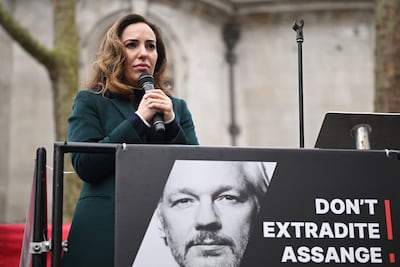
“WikiLeaks published ground-breaking stories of government corruption and human rights abuses, holding the powerful accountable for their actions.
"As editor-in-chief, Julian paid severely for these principles, and for the people’s right to know.
“As he returns to Australia, we thank all who stood by us, fought for us and remained utterly committed in the fight for his freedom. Julian’s freedom is our freedom.”
Assange’s mother, Christine Assange, told Australia’s Sky News that she was “grateful” her son’s ordeal was “finally coming to an end”.
“This shows the importance and power of quiet diplomacy. Many have used my son’s situation to push their own agenda, so I am grateful to those unseen, hard-working people who put Julian‘s welfare first,” she said.
“The past 14 years have obviously taken a toll on me as a mother, so I wish to thank you in advance for respecting my privacy.”
Julian Assange's legal battle – in pictures
Speaking on Assange’s release, Australian Prime Minister Anthony Albanese told the nation’s parliament on Tuesday “we want him brought home to Australia”.
“I’ve been very clear as both the Labour leader and opposition, but also as Prime Minister that – regardless of the views that people have about Mr Assange’s activities – the case has dragged on for too long,” he said.
“There is nothing to be gained by his continued incarceration and we want him brought home to Australia.”


